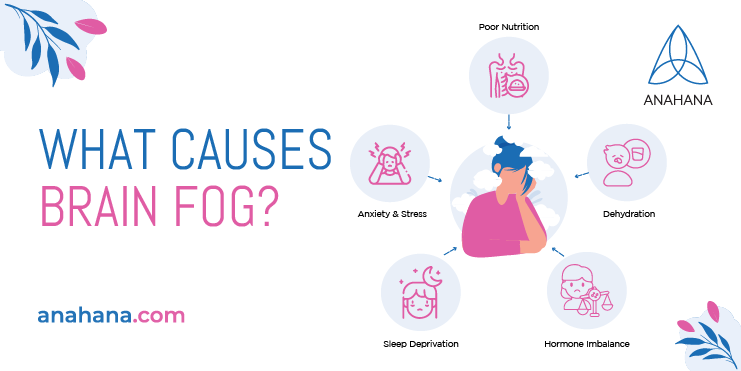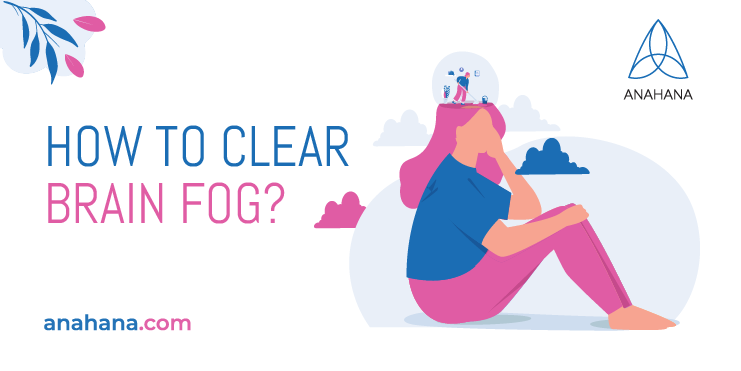
Table of Contents
Experiencing brain fog can mean having feelings of confusion, forgetfulness, and lack of concentration. Various things, including stress, anxiety, sleep deprivation, and diet, can cause it.
Brain Fog Explained
Have you ever experienced brain fog? It's like a cloud settling over your thoughts, making it difficult to concentrate, think, or remember things you normally would. These frustrating experiences are more formally seen as cognitive challenges or cognitive symptoms, and they sure can impact your day-to-day life and mental health.
But what exactly causes brain fog, and how does it affect us? In this article, we'll explore the ins and outs while also exploring practical strategies you can use to overcome mental exhaustion and fogginess to regain clarity of thought and take compassionately take care of yourself and needs!
Common Signs of Brain Fog
Ultimately, the key to improving brain function and reducing the fog is identifying the underlying cause and working to address it through lifestyle changes or medical treatment as needed.
The symptoms can vary from person to person; however, some common symptoms of impaired brain functions include:
-
Difficulty concentrating or focusing on tasks
-
Difficulty communicating or finding the right word for what you are thinking or feeling
-
Forgetfulness or memory problems
-
Feeling “groggy”, dizzy, or experiencing headaches
-
Lack of motivation or energy, in some cases, even chronic fatigue syndrome
-
Symptoms of depression (lack of energy, slowed thinking)
The best way to determine if the dreaded "mental fog" impacts your day-to-day life is to track the warning signs. One option is to keep a journal to record when brain fog strikes and what might have happened right before.
Other options include using online brain performance tests or speaking with your doctor about cognitive difficulties.
Common Causes of Brain Fog

If you've noticed moments where your thoughts feel a bit cloudy, there could be many reasons behind it. Sometimes, just making small adjustments to your lifestyle or considering external factors like stress or sleep habits can help clear that pesky fog.
Imbalanced Nutrition
Poor nutrition or gut health can cause brain fog.
The brain is a highly active organ that requires constant nutrients to function correctly. When we don't eat right, our brain doesn't get the fuel it needs to perform at its best.
Certain nutrients, including omega-3 fatty acids, B vitamins, and antioxidants, are vital for our brain health.
-
B Vitamins: While vitamin B5 promotes the digestive system support and healthy skin, vitamin B6 involves immune function and brain development, aiding in the formation of neurotransmitters (chemical messengers in the brain). Vitamin B12 is required to develop and construct red blood cells and DNA. B3 helps enzymes function by helping the body use other B vitamins.
-
Omega-3 fatty acids: Omega-3 fatty acids are unsaturated fats essential for human health. Omega-3 fatty acids are found in oily fish, such as salmon and tuna, flaxseeds, chia seeds, and walnuts. Studies have shown that omega-3 fatty acids offer multiple benefits for brain health. For example, omega-3 fatty acids improve cognitive function and reduce inflammation in the brain.
Lack of Sleep
One of the most important things you can do is is to ensure you're getting proper sleep. Sleep is absolutely critical for brain health.
When you sleep, your brain can rest and repair itself. This means that if you're not getting enough sleep, your brain won't be able to function at its best.
Lack of sleep has been linked to many problems, including memory loss, difficulty focusing, depression and mood swings.
So, if you hope to clear the brain fog, ensure you get plenty of rest. If you believe you are suffering from a sleep disorder, speak with your doctor or a medical professional.
Chronic Stress
When we are constantly stressed, it can trigger brain fog by setting off a chain reaction in our bodies. This includes releasing hormones like cortisol, which, over time, can disrupt the delicate balance of chemicals in our brains, leading to cognitive difficulties. As a result, we may find it harder to concentrate, experience memory lapses, and struggle with decision-making.
Immune System
The immune system and brain fog are closely connected, as the brain regulates both functions. It produces immunoglobulins, which help regulate the body's response to pathogens (things that can make us sick, like bacteria or viruses).
Similarly, brain fog can be caused by imbalances in the immune system, as certain health conditions can trigger chronic inflammation and disrupt brain chemistry. For instance, individuals undergoing cancer treatment may experience cognitive difficulties known as "chemo brain."
Additionally, long COVID brain fog is another example where immune system dysregulation can contribute to mild cognitive impairment.
This is why managing your immune system and reducing your risk of inflammation are critical strategies for effective prevention. Eating a healthy diet filled with anti-inflammatory foods is highly recommended.
Central Nervous System Dysregulation
The central nervous system and brain fog are closely interconnected, influencing the other in a complex feedback loop.
-
Neurological disorders: Brain fog can be a symptom caused by conditions affecting the nervous system, such as Parkinson's or Alzheimer's disease. These illnesses often disrupt brain function, leading to confusion, memory loss, and difficulty concentrating.
-
Hormones: Stress hormones like cortisol and adrenaline can have adverse effects on the brain, contributing to brain fog symptoms like feeling disconnected from your thoughts or struggling with concentration and focus.
-
Anxiety and Stress: When you are anxious or stressed, your brain is in a constant state of alertness, which can lead to foggy thinking. Additionally, these mental states can hinder concentration, further contributing to brain fog.
-
Trauma: Experiencing trauma can also factor into brain fog. The brain's response to trauma may disrupt cognitive function, leading to confusion and difficulties with focus.
Hormonal Imbalances and Fluctuations
Hormone changes during pregnancy or menopause often affect concentration, memory, and overall focus. This brain fog can sometimes signal that our hormones or endocrine system are out of balance - but don't fret, this is common and in many ways natural depending on where womxn are in their cycle, etc.
While these natural hormonal fluctuations during the cycle can indeed result in fogginess, the closer you are to the luteal phase, the more likely you are to develop brain fog!
In some cases, prolonged hormone imbalances can result in or exacerbate mental health conditions like depression, anxiety, or fatigue. Other conditions like Premenstrual Dysphoric Disorder (PMDD) and Polycystic Ovarian Syndrome (PCOS) may also lead to brain fog among other uncomfortable symptoms.
How to Clear Brain Fog

While brain fog can have many causes, including stress, sleep deprivation, and certain medical conditions, some simple steps can help clear the haze, improve cognitive function, and get you back to feeling more like yourself!
Move Your Body
Regular exercise is one of the most effective ways to combat brain fog. Physical activity helps to improve blood circulation, delivers oxygen and other essential nutrients to the brain, and lowers blood pressure.
Not surprisingly, exercise also helps to reduce stress levels and promote better sleep - two things we our brain needs to be healthy!
Understanding that sometimes when we feel low, intense workouts aren't particularly appealing. Try and be gentle with yourself while getting some movement, even with a mindful walk around your neighborhood or local park.
Fuel Your Body
A diet rich in fresh fruits and vegetables, whole grains, probiotics (safely) or fermented foods, and healthy fats gives the brain the fuel to function optimally. Loading up on healthy amounts of Vitamin B12 will also help with brain fog in part through red blood cell formation.
Conversely, a diet high in processed foods and sugar can contribute to or worsen brain fog.
Lots of Rest
"She believed that she could, but she was exhausted, so she made time to rest first & did it later."
The brain needs time to rest and repair itself after a long day of work, and insufficient sleep can lead to problems with focus and concentration.
If you have trouble sleeping, try to establish a regular sleep routine, including winding down for 30 minutes before bedtime and disconnecting from electronic screens at least an hour before sleep.
Reducing stimulating activities like these will calm your mind and body and prepare itself for rest. Sleep meditations before bed can help promote a state of restfulness.
Reduce Stress
Stress can lead to brain fog, whether caused by work, family commitments, or other factors. Fortunately, one effective strategy for treating brain fog is meditation.
By refocusing our attention and calming our minds, meditation can help clear away stress and fatigue, making it easier to think clearly and focus on the task.
Additionally, research has shown that regular meditation can change brain structure, increasing neural connectivity and improving brain function in different areas.
So, if you are dealing with brain fog, try incorporating some time for mindfulness into your normal daily routine – you may find that the mental clarity you gain is well worth a few minutes of peaceful introspection.
Breathing
One of the most effective is simply to focus on your breathing. Choose from a beautiful selection of breathing exercises as a simple and effective way to combat brain fog.
Deep breathing helps oxygenate the blood and deliver more oxygen to the brain. These increased oxygen levels can help patients fight inflammation, improve brain function and reduce feelings of fatigue.
Next time you feel foggy, take a few deep breaths and see if it makes a difference. Additionally, try to get some fresh air every day. Spending time outside can have tremendous benefits.
Resources
Reasons You May Have Brain Fog
What is brain fog? | Journal of Neurology, Neurosurgery & Psychiatry
Strategies for Busting Up Brain Fog
Clouding of consciousness - Wikipedia
Disclaimer
The contents of this article are provided for informational purposes only and are not intended to substitute for professional medical advice, diagnosis, or treatment. It is always recommended to consult with a qualified healthcare provider before making any health-related changes or if you have any questions or concerns about your health. Anahana is not liable for any errors, omissions, or consequences that may occur from using the information provided.

By: Anahana
The Anahana team of researchers, writers, topic experts, and computer scientists come together worldwide to create educational and practical wellbeing articles, courses, and technology. Experienced professionals in mental and physical health, meditation, yoga, pilates, and many other fields collaborate to make complex topics easy to understand. Anahana is also home to specialists in crystals, tarot, angel numbers, astrology, life path numbers, zodiac signs, and horoscopes. By combining evidence-based wellness with spiritual and energetic practices, the team offers clear, trustworthy guidance for both mind-body health and modern spirituality.